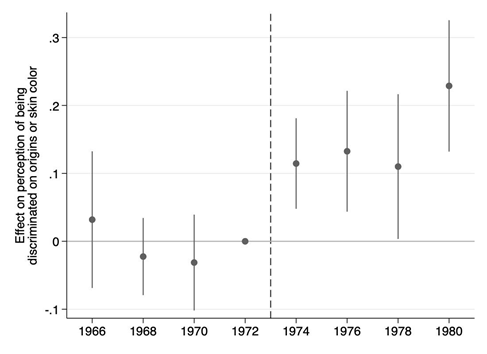Immigration and Citizenship
The TNA experience has been highly beneficial for my research on immigration and citizenship. During my research stay at the Paris School of Economics, I was able to present my work, gain valuable feedback, and collaborate with my co-authors. These interactions have supported progress on our joint projects, including a correspondence study experiment and an investigation into the unintended consequences of symbolic naturalization reforms.
I have been able to exchange with my co-authors on a correspondence study experiment that we are currently launching. The objective of the project is to investigate the impact of citizenship acquisition on immigrants' integration. It aims at determining whether citizenship acquisition can be an effective policy to promote integration. It does so by examining the effect of citizenship acquisition on immigrant’ social and economic integration and its various channels. Since this experiment is currently being implemented, more details cannot be provided on this study at this stage.
In addition to the correspondence study experiment, I have been working on a related project that examines the impact of a symbolic change in France's naturalization rules for second-generation immigrants. This reform targeted individuals born in France to foreign parents, altering the process by which they could acquire French citizenship. Previously, these individuals were automatically granted citizenship at a certain age. However, the reform introduced a requirement for them to formally declare their willingness to become French in order to obtain citizenship.
Although this change might seem procedural, it carried significant symbolic weight. By requiring second-generation immigrants to actively affirm their desire to naturalize, the French state sent a subtle but powerful message that these individuals were not inherently part of the national community. For many, this reform was perceived as a signal that their presence and belonging were conditional, leaving them feeling unwelcome in their country of birth.
With my co-authors, we analyzed the effects of this policy change and found evidence of a backlash. The requirement to declare intent to naturalize had a noticeable impact on the affected individuals' sense of belonging. Rather than fostering integration, as was the stated goal of the policy, it led to a lower sense of connection to the host country. This erosion of national identity highlights how symbolic gestures in policy can have profound psychological and social repercussions.
Interestingly, the reform did not lead to measurable changes in economic integration, such as employment outcomes or earnings. However, it had a pronounced negative impact on cultural integration. By signaling exclusion, the policy made it harder for second-generation immigrants to feel connected to the cultural norms and values of the host society, ultimately undermining their ability to integrate fully on a social level.
Our findings underscore the complex interplay between policy design and integration outcomes. While the reform was intended to promote inclusion, its symbolic elements inadvertently created barriers, emphasizing the importance of carefully considering the broader implications of policy changes. Rather than encouraging a shared sense of belonging, this measure alienated those it aimed to include, highlighting the potential for even well-intentioned policies to backfire if they are perceived as exclusionary.

This research contributes to ongoing debates about the best ways to foster integration in increasingly diverse societies. It illustrates how policies that appear straightforward on the surface can carry unintended messages that resonate deeply within the communities they target. By examining these dynamics, we hope to inform more inclusive and effective approaches to integration in the future.
Personal Experience with the TNA Visit
Both projects have largely benefited from presentations at the Paris School of Economics and exchanges with the vibrant research community at large. This TNA visit has allowed me to have face-to-face interactions with my co-authors, and to make new connections with researchers at the Paris School of Economics. We are currently discussing new research ideas with some of the researchers I have met during my TNA stay.

